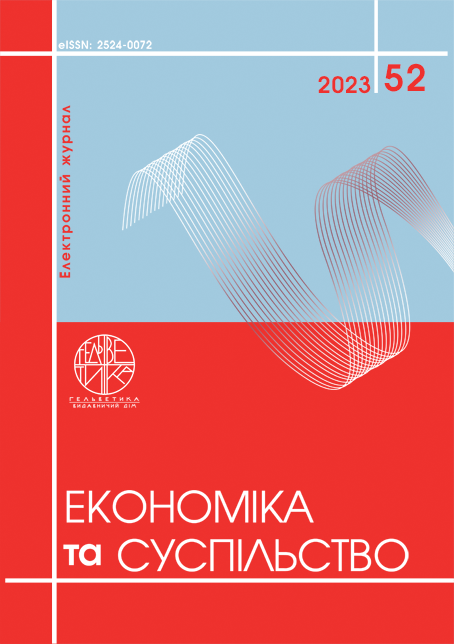THE EFFECT OF MEDIA LITERACY ON THE SOCIO-ECONOMIC ACTIVITY OF THE CITIZENS OF EUROPEAN COUNTRIES
Abstract
The article examines the role of the media as a powerful force that influences the formation of public opinion and the organization of economic and social state policy. It is noted that media literacy is an important social resource that allows citizens of European countries to go beyond the role of passive media consumers and actively participate in socio-economic processes. It was determined that media literacy has become a fundamental component of democracy and allows the public to navigate and participate in complex socio-economic processes, to contribute to decision-making at various levels of government. The influence of education on the participation of citizens in socio-economic processes was studied in European countries, which shows the tendency of people with a higher level of education to various forms of socio-economic participation and indicates the connection between education and socio-economic activity of the population. It is noted that the level of education is directly related to the level of media literacy. It was determined that people with a higher level of media literacy more often became participants in discussions on socio-economic problems. The importance of education for promoting citizen participation in socio-economic processes and directing efforts to reduce the gap in education as an effective strategy for increasing democratic participation and promoting socio-economic activity in European countries with a generally lower level of education is emphasized. The dependence of media literacy on the income level of the population is analyzed. It was revealed that people with the highest income in most European countries were more likely to be socially and economically active, sign petitions, attend meetings or demonstrations, contact elected representatives, and discuss economic issues than people with the lowest income. It has been proven that media literacy affects the formation of social and economic culture in European countries. It was determined that along with media literacy, cultural and historical influences, the degree of democracy, the level of economic stability, the general standard of living of the population, the levels of income and unemployment play an important role in the involvement of the public in the socio-economic life of the country. European citizens must have access to reliable sources of news, be aware of their rights and responsibilities, and be able to express their views and participate in discussions on socio-economic issues.
References
Understanding media and information literacy (MIL) in the digital age a question of democracy / ed. U. Carlsson. Göteborg: University of Gothenburg, 2019. 266 p.
Ashley S., Maksl A., Craft S. News media literacy and political engagement: What’s the connection? Journal of Media Literacy Education. 2017. Vol. 9, № 1. P. 79–98.
Masterman L. A rationale for media education. Media literacy in the information age / ed. R. Kubey. New Brunswick, NJ: Transaction, 1997. P. 15–68.
Mihailidis P., Thevenin B. Media literacy as a core competency for engaged citizenship in participatory democracy. American behavioral scientist. 2013. Vol. 57, № 11. P. 1611–1622.
Koh A. A., Lim S. S. Media literacy for marginalized communities: A case study of an ethnic minority group in Singapore. The future of media education: Theoretical and practical perspectives / ed. Y. Punie, D. Redecker. Berlin: Springer, 2018. P. 161–180.
European social survey. ESS Round 8: The ESS data archive. 2.1 ed. Norwegian centre for research data. 2016. 190 p.
Zalc J., Becuwe N., Buruian A. The 2019 post-electoral survey: Have European elections entered a new dimension? Eurobarometer survey 91.5 of the European Parliament. Brussels: European Union, 2019. 116 p.
European Commission. European Media Literacy Week 2018: Final report. 2018. 27 p.
Kahne J., Bowyer B. Educating for democracy in a partisan age: Confronting the challenges of motivated reasoning and misinformation. American Educational Research Journal. 2017. Vol. 54, № 1. P. 3–34.
Hobbs R., Frost R. Measuring the acquisition of media literacy skills. Reading Research Quarterly. 2012. Vol. 47, № 1. P. 60–81.
Pew Research Center. News Use Across Social Media Platforms 2018. 2018. URL: https://www.journalism.org/2018/09/10/news-use-across-social-media-platforms-2018/
Покулита І.К., Колотило М.О. Медіапрактики у соціальній роботі: підручник. Київ : КПІ ім. Ігоря Сікорського, Вид-во «Політехніка», 2020. 192 с.
Carlsson, U. (Ed.). (2019). Understanding media and information literacy (MIL) in the digital age a question of democracy. Göteborg: University of Gothenburg. 266 p.
Ashley, S., Maksl, A., Craft, S. (2017). News media literacy and political engagement: What’s the connection? Journal of Media Literacy Education, vol. 9, no. 1, pp. 79–98.
Masterman, L. (1997). A rationale for media education. Media literacy in the information age. R. Kubey (Ed.). New Brunswick, NJ: Transaction, pp. 15–68.
Mihailidis, P., Thevenin, B. (2013). Media literacy as a core competency for engaged citizenship in participatory democracy. American behavioral scientist, vol. 57, no. 11, pp. 1611–1622.
Koh, A. A., Lim, S. S. (2018). Media literacy for marginalized communities: A case study of an ethnic minority group in Singapore. The future of media education: Theoretical and practical perspectives. Y. Punie, D. Redecker (Ed.). Berlin: Springer, pp. 161–180.
Norwegian centre for research data (Ed.). (2016). European social survey. ESS Round 8: The ESS data archive. 2.1, 190 p.
Zalc, J., Becuwe, N., Buruian, A. (2019). The 2019 post-electoral survey: Have European elections entered a new dimension? Eurobarometer survey 91.5 of the European Parliament. Brussels: European Union, 116 p.
European Commission. (2018). European Media Literacy Week 2018: Final report. 27 p.
Kahne, J., Bowyer, B. (2017). Educating for democracy in a partisan age: Confronting the challenges of motivated reasoning and misinformation. American Educational Research Journal, vol. 54, no. 1, pp. 3–34.
Hobbs, R., Frost, R. (2012). Measuring the acquisition of media literacy skills. Reading Research Quarterly, vol. 47, no. 1, pp. 60–81.
Pew Research Center. (2018). News Use Across Social Media Platforms 2018. Available at: https://www.journalism.org/2018/09/10/news-use-across-social-media-platforms-2018/
Pokulyta, I.K., Kolotylo, M.O. (2020). Mediapraktyky u sotsialnii roboti: pidruchnyk [Media practices in social work: a textbook]. Kyiv: KPI im. Ihoria Sikorskoho, Vyd-vo «Politekhnika», 192 p. [in Ukrainian]
Copyright (c) 2023 Лариса Чернишова

This work is licensed under a Creative Commons Attribution 4.0 International License.


